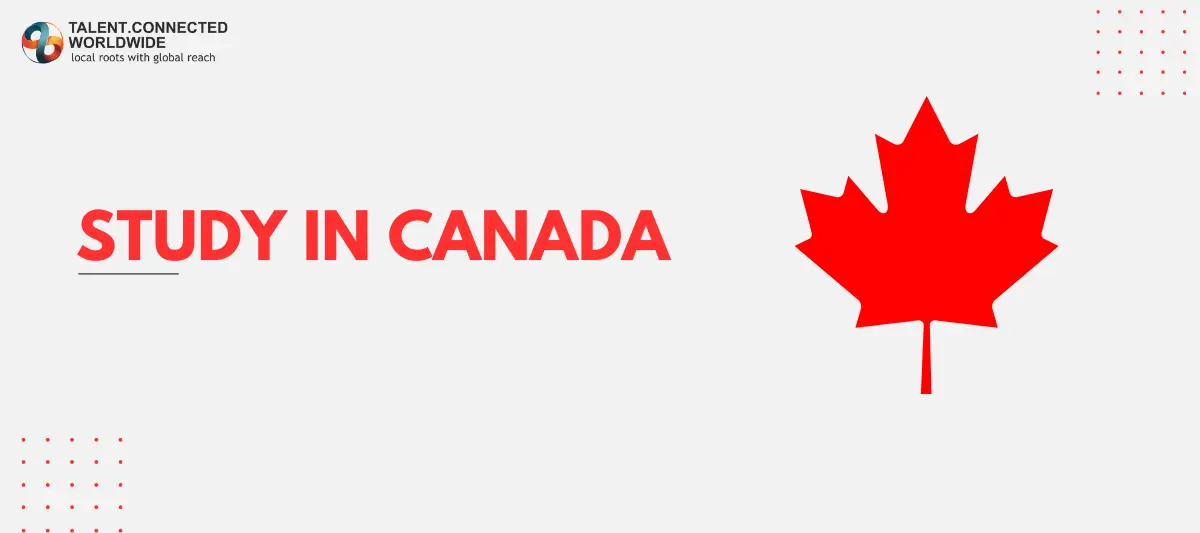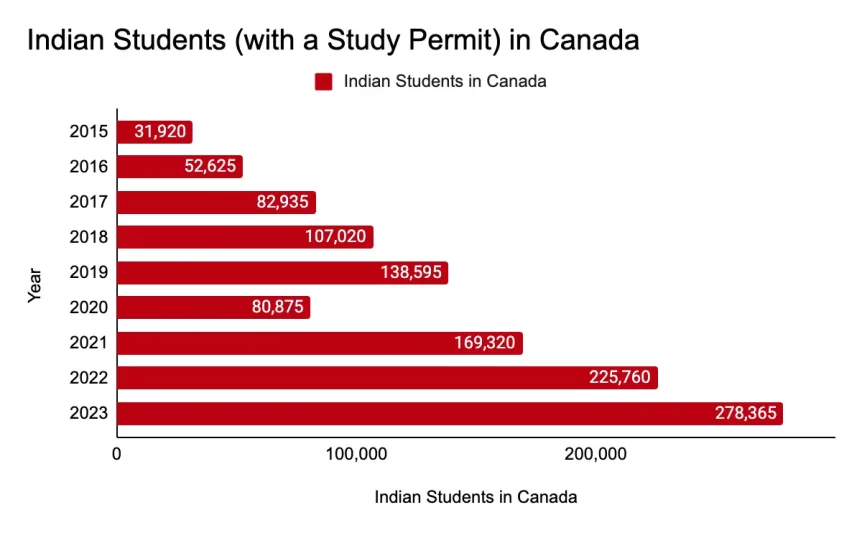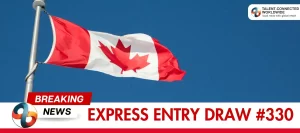
Studying in Canada comes with several important benefits for international students. Canada has been among the most popular destinations for Indian students. In 2023, the country invited as many as 278,365 Indian students and has already issued 81,185 study permits in 2024. As much as 60% of international students eventually immigrate to Canada as permanent residents. This blog will help you decide why you should study in Canada and is a complete guide to applying for a study permit in the country.
Download Free Immigration and PR Guide PDF
Study in Canada: Overview
- Cost of studying in Canada
- How to study in Canada
- Documents needed to study in Canada
- Best Universities to study in Canada
- Important changes for International students
Why Study in Canada?
You must study in Canada,
- to receive education from world-ranking universities,
- to earn and live a better life,
- to receive better employment opportunities, and
- to secure a stable life
Number of Indian Students in Canada
In 2023, 278,365 Indian students received Canadian study permits.

Source: IRCC Open Government Data
Cost of studying in Canada
The cost of studying in Canada depends on the course and university you are enrolled in. On average, the tuition fee for an international undergraduate is $38,081 (Canadian Dollars). On the other hand, the average cost of graduate courses in Canada is $22,061 (Canadian Dollars). The average tuition fees in various Canadian provinces are given in the table below.
| Canadian Provinces | International Graduates in 2023-2024 | International Undergraduates in 2023-2024 |
|---|---|---|
| Canada | $22,061 | $38,081 |
| Ontario | $28,152 | $46,433 |
| British Columbia | $23,441 | $35,266 |
| Quebec | $20,034 | $31,887 |
| Alberta | $18,018 | $31,549 |
| Manitoba | $12,748 | $18,912 |
| Saskatchewan | $8,965 | $27,781 |
| Nova Scotia | $22,768 | $25,521 |
| New Brunswick | $13,654 | $17,800 |
| Newfoundland and Labrador | $4,806 | $17,477 |
| Prince Edward Island (PEI) | $11,502 | $19,750 |
Besides the tuition fee, international students will also need to pay for GRE/TOEFL exams, IELTS exams, study permits, and other expenses. Your visa representative will be the most reliable source to provide you with the accurate cost of studying in Canada.
Proof of Funds for International Students
While applying for a study permit, you will need to prove that you have at least $20,635 per year to sustain yourself and your family members accompanying you to Canada. The proof of funds required for studying in Canada is given below.
| Money required per year | Number of Family members |
|---|---|
| $20,635 | 1 |
| $25,690 | 2 |
| $31,583 | 3 |
| $38,346 | 4 |
| $43,492 | 5 |
| $49,051 | 6 |
| $54,611 | 7 |
| $5,559 | For each additional family member |
How to study in Canada?
To study in Canada, follow these steps.
- Select the course and the university you want to enroll in.
- Research all the eligibility requirements of the University as well as of the province it is located in.
- Take the GRE, TOEFL, and IELTS tests if required by the university.
- Get admission to the selected university
- Apply for a Study Permit
- Upload all documents along with the Provincial Attestation Letter (PAL)
- Get a study permit and a Letter of Introduction from the IRCC
- Submit your passport to the Visa Application Center (VAC)
- Get a visitor visa stamped on your passport.
Documents required to study in Canada
While you apply to a Canadian University, you will need to submit documents such as your previous academic transcripts and degrees, test scores (if taken), identity documents, etc. The document checklist varies according to the University you are applying to. However, applying to a study permit so you could study in Canada requires the following documents:
- Proof of acceptance from the university
- Provincial Attestation Letter from the University (PAL)
- A valid passport
- Two passport-size photographs
- Proof of funds
- Letter of explanation that includes your reasons for studying in Canada
- Medical Exam
- Biometrics
Top 10 Universities to Study in Canada
University of Toronto, McGill University, and British Columbia University are the top three institutions to study in Canada. The top 10 Canadian universities for international students are given in the table below.
| Canadian University | Rank in Canada | Global Rank |
|---|---|---|
| University of Toronto, Ontario | 1 | 21 |
| McGill University, Quebec | 2 | 30 |
| University of British Columbia, BC | 3 | 34 |
| University of Alberta, Alberta | 4 | 111 |
| University of Waterloo, Ontario | 5 | 112 |
| Western University, Ontario | 6 | 114 |
| Montreal University or Université de Montréal, Québec | 7 | 141 |
| University of Calgary, Alberta | 8 | 182 |
| McMaster University, Ontario | 9 | 189 |
| University of Ottawa, Ontario | 10 | 203 |
The Best Universities in Canada for STEM subjects
Here are some of the best universities in Canada STEM subjects.
| Canadian University | Global Rank for STEM courses |
|---|---|
| University of Toronto | 17 |
| University of British Columbia | 25 |
| McGill University | 39 |
| University of Waterloo | 40 |
| University of Alberta | 100 |
| Université de Montréal | 111 |
| University of Calgary | 153 |
| Queen’s University at Kingston | 200 |
| McMaster University | 226 |
| University of Ottawa | 234 |
The Best Universities for Studying Arts in Canada
Canada offers arts courses that are among the best in the world. The University of Toronto, the University of British Columbia, and McGill University are the best institutions to study arts in Canada.
| Canadian University | Global Rank for Arts and Humanities |
|---|---|
| University of Toronto | 10 |
| University of British Columbia | 18 |
| McGill University | 29 |
| Université de Montréal | 117 |
| University of Alberta | 137 |
| York University | 157 |
| Queen’s University at Kingston | 183 |
| Concordia University | 203 |
| Western University | 203 |
| University of Ottawa | 207 |
Best Colleges for studying MBA in Canada
Rotman School of Management, Desautels Faculty of Management, and Ivey Business School are the top three MBA colleges for international students to study in Canada. The best Canadian business schools are listed below.
| MBA Colleges | University | Location |
|---|---|---|
| Rotman School of Management | University of Toronto | Toronto, Ontario |
| Desautels Faculty of Management | McGill University | Montreal, Quebec |
| Ivey Business School | Western University | London, Ontario |
| Sauder School of Business | University of British Columbia | Vancouver, British Columbia |
| Smith School of Business | Queen’s University | Kingston, Ontario |
| Schulich School of Business | York University | Toronto, Ontario |
| Alberta School of Business | University of Alberta | Edmonton, Alberta |
| John Molson School of Business | Concordia University | Montreal, Quebec |
| HEC Montréal | – | Montreal, Quebec |
| DeGroote School of Business | McMaster University | Hamilton, Ontario |
| Rowe School of Business | Dalhousie University | Halifax, Nova Scotia |
Important Changes for International Students in Canada
IRCC has implemented significant changes for students to study in Canada. In recent years, some Canadian institutions have been enrolling students for economic gains without considering their prospects. IRCC aims to protect international students and help them have a sustainable future in the country. For this reason, it has proposed and introduced some changes for international students.
- The Immigration, Refugees and Citizenship Canada (IRCC) will limit the number of study permits to 360,000 students. This is 35% less than the study permits issued in 2023. Additionally, Each Canadian province has also established intake limits for international students. This change is exclusively for undergraduate students. It will not impact master’s and doctoral degrees.
- To implement the international student limits in Canadian provinces, each student must submit a Provincial Attestation Letter.
- From September 2024, students who are enrolled in a private college that is licensed to deliver courses of a public college, will not be eligible for a Post Graduate Work Permit (PGWP).
- International graduates with a master’s degree will soon be eligible to apply for a three-year work permit.
- Only spouses of international students who are enrolled in master’s or doctoral degrees will be eligible for the Open Work Permit. Spouses of foreign students studying any other courses will no longer be eligible for an Open Work Permit.
These changes will eventually improve the experiences of international students studying in Canada and will improve their future in the country.
Talent Connected Worldwide offers the most reliable, lowest guaranteed price, and successful study permit consultation. We have the highest success rate for international students.
Contact us now and kickstart your glorious future.






